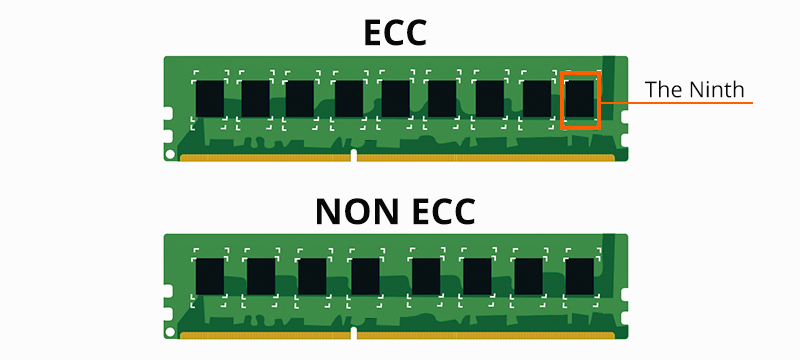Ecc vs. Non Ecc Memory: Which One Is Better?
The main reason why ECC memory is favored is that it prevents data errors in server memory, ensuring system operation stability. An important place to prevent data errors is in the server RAM that temporarily stores data, so ECC memory can also be called ECC RAM. Generally, ECC memory differs from non-ECC memory in that it uses error correction codes to correct memory data. Speaking of which, we will wonder, which ECC memory or non-ECC memory is more suitable for our use environment? Let's explore ECC vs. non-ECC memory.
What is ECC and Non ECC Memory?
ECC is a type of server memory that monitors memory data for errors to protect your system from potential threats. The main idea is to add a ninth computer chip to server RAM. The main function of this ninth chip is that it is exclusively responsible for checking for errors and correcting them. Non-ECC memory has only eight chips and does not perform data monitoring and error correction, which is the biggest difference between ECC and non-ECC memory.

But why are there errors? There are two main types of errors: memory and unit errors, while unit errors are the most common. Memory errors are due to electrical and magnetic perturbations inside the computer that causes DRAM to spontaneously transfer to the opposite state. Unit errors are when one bit of a data octet (binary 1 or 0) changes to the opposite value without awareness. Unit errors occur in subtle ways and have little impact on the data, but still have some effect on the operating system. There is also a unit memory error that includes hard and soft errors. Hard errors are mostly physical factors such as voltage, shock, and temperature changes. Soft errors are caused by writing data that is not as expected. When data goes in and out of server RAM, some corruption happens.
How Does ECC Memory Work?
The method of ECC memory to detect errors is parity. From the description in the previous section, we can know that the server RAM is checked for errors and corrected by adding the ninth byte. However, parity mainly detects whether a byte will appear even or odd by adding 0 or 1 to the end of the byte. For example, if parity adds bytes to odd bit 7, then parity is 1, and the even will be 8. If the parity byte is 0 and a result is an odd number, the byte is in a corrupt state.
Naturally, the parity bit of ECC memory is not always an 8-bit byte, it is also possible to generate a 7-bit code/64-bit byte by using binary cyclic error correction code. What this means here is that every time the system reads 64 bits of data, it generates a 7-bit code. The purpose of the detection is to determine whether the code matches. If the mismatch means it has an error, the ECC memory will correct the error immediately.

Advantages and Disadvantages of ECC Memory
When you apply ECC memory to your server, it monitors memory data and corrects errors in a timely manner. First, this somewhat reduces the number of crashes, especially in devices that cannot withstand memory data corruption, such as computing applications or servers in the scientific and financial industries. Secondly, its data error correction can maintain data integrity and enhance system stability. In the data center, ECC is more reliable than non-ECC memory.
However, ECC memory does not only bring advantages, and there are also some disadvantages. Compared to non-ECC memory, ECC memory is more expensive because of the extra memory chips and their complexity. Also, not all computers need to use ECC memory. In some important and complex work environments, server and workstation motherboards need to be configured with ECC memory. What's more, in terms of reading speed, ECC memory is slightly slower than non-ECC memory by about 2% because of the extra time required to check memory data errors.
Which One Is Better: ECC vs. Non ECC Memory?
There is no absolute standard of judgment between ECC and non-ECC memory to say which is better, it needs to be specific to the environment. If your industry is the financial or medical industry or other critical data-related industries, you must consider configuring ECC memory in data center servers. Why is it necessary to configure it? Because it can reduce security breaches, and data transcription errors, prevent information corruption and system crashes, etc., and achieve data accuracy and system stability. In such industries, the impact of data errors can be fatal. It can cause data to be coded incorrectly or corrupted, directly affecting your financial business. The specific embodiment of medical treatment is that the data is not matched correctly, resulting in serious consequences. It relies on the support of the CPU and the memory itself, while UDIMM supports ECC memory.
If you're just a regular PC user, or don't plan to use mission-critical equipment for major projects, you can choose DRAM or non-parity SDRAM.
Conclusion
To sum up, compared to non-ECC memory, ECC memory gets the main purpose of is the most important for data monitoring and error correction to maintain the stability of the server operating system. While ordinary equipment or PCs do not need to have ECC memory installed, if it is a sensitive, demanding work environment, such as data centers, then some measures to prevent any errors must be implemented.
You might be interested in
Email Address

-
PoE vs PoE+ vs PoE++ Switch: How to Choose?
Mar 16, 2023















